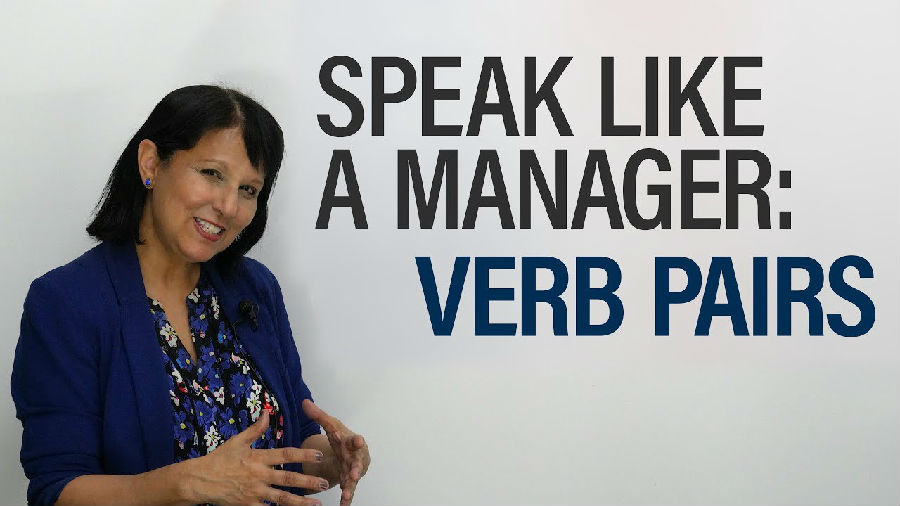Hi. I'm Rebecca from engVid, back with another Speak Like a Manager lesson.
大家好,我是来自engVid的Rebecca,今天为大家带来另一期《经理说话法则》课程。
All of these lessons are designed to help you improve your level of business English
所有这些课程都是为了帮助大家提高商务英语能力。
so that you can sound more professional in the workplace. All right?
这样大家就可能在工作场合中听起来专业一点,好吗?
Now, in this particular lesson, we're going to focus on a very important part of any English sentence, which is the verb.
在本期课程中,我们将着重讲解英语句子中一个非常重要的部分——动词。
And we're going to look at business verbs that are opposites. All right? So, first I'm going to give you the opposites,
我们将要讲解商务英语动词以及它的反义词。所以首先我讲解词汇及其反义词,
and then we'll play a little game to help you make sure that you actually know them when you need them,
然后我们还会玩些小游戏帮助大家能够在需要时用上这些词汇,
because in speaking, you can't think too much. Right? You've got to work fast and think on the spot. So, let's get started.
因为在说话时,我们是没有时间想词汇的,对吗?工作要迅速,临场反应也要快。所以我们开始吧。
All right. So, the first pair of words and verbs is: 'increase' and 'decrease'. All right?
好了,第一组动词是:‘增加’和‘减少’。
Say it after me: 'increase', 'decrease'. So, 'to increase' means to go up - prices went up, prices increased; prices decreased.
跟我读一遍:‘increase’,‘decrease’。‘To increase’指的是上涨——价格上涨;价格下降。
Okay? So, 'decreased' means to go down. All right.
所以‘decreased’指的是下降。
The next pair: 'promote', 'demote'. Say it after me: 'promote', 'demote'. So, what does that mean?
下一组:‘升职’,‘降职’。跟我读一遍:‘promote’,‘demote’。所以这两个词是什么意思呢?
When somebody gets a higher position, he is promoted or she is promoted;
当某人得到一个更高的职位,那么他或她就是升职了;
when somebody gets a lower position, that means they had a certain position and now they have been sent down. Okay?
当某人获得了一个更低的职位,这意味着他们本来就任某个职位,现在他们降职了。
They lost that higher position and they've been given a lower position, then that person is demoted.
他们失去了那个更高的职位,得到了一个更低的职位,那么这个人就是被降职了。
Now, that often happens... For example, you might hear about it happening in the army;
这是经常发生的事......例如,你可能听说过军队里发生过这样的事;
somebody had a higher-level position and now they have a lower-level position. They were demoted. All right?
某人职位较高,但现在他们得到了一个更低的职位,那么他们就是被降职了。
Doesn't happen all that often, but it does happen,
不常发生,但却是会发生,
and you want to make sure that you have the vocabulary to express that situation. All right? 'Promote', 'demote'.
一定要确保自己能用上表述该情景的单词,好吗?这是‘升职’和‘降职’。
Next: 'hire' and 'fire' or 'dismiss'. So, 'hire', you know, is like 'recruit'; when someone is given a job.
下一个:‘雇佣’和‘解雇’。‘hire’和‘recruit’同义,都是指某人获得了一份工作。
When a company takes a person on and gives him a job or gives her a job, they hire that person.
当公司招了一个人并给了他或她一份工作,那么该公司就是雇佣了这个人。

And when that person is told to go away, they no longer have their job, the slang for that is 'fire'.
当一个人被告知离开,他们不再为他提供这份工作,就是‘fire’解雇,这个词是俚语。
So, lots of people know the opposite: 'hire' and 'fire', but 'fire' is actually slang. Okay?
很多人都知道这对反义词:‘hire’和‘fire’,但是‘fire’其实是俚语。
'Hire' is not slang; 'hire' is a proper business word. Another business word, here, is 'recruit', but let's stay with 'hire'.
‘Hire’不是俚语;‘hire’是一个商务词汇。另一个商务词汇是‘recruit’,但是我们这里只讲解‘hire’。
'Fire' is slang, so instead of... Maybe you don't want to use the slang term; you want to use the proper businesslike term,
‘Fire’是俚语,可能大家不想使用俚语,而想要使用合适的商务术语,
and the proper word for that is to 'dismiss'. Okay? Somebody was dismissed.
一个合适的替换词是‘dismiss’。某人被解雇了。
That means they were told to go away; their job was not there anymore. Okay?
这意味着他们被告知离开公司,公司不再给他们这份工作了。
They didn't have their job anymore. They were dismissed.
他们失业了,被解雇了。
Now, you might hear the word 'dismissed' in a slightly different context.
在一些稍微不同的语境中,大家可能也听过‘dismissed’这个词。
Sometimes you might see it in a movie where they're showing somebody in the army,
有时你可能会在电影中看到,军队里的某个人
and the General is telling the soldier: 'Dismissed. You are dismissed.'
某个将军告诉士兵们:‘解散。大家可以解散了。’
So that also has the idea of being told to go away, but it doesn't mean that person...
这也是让大家离开的意思,但是这并不是
that soldier has lost his or her job; it just means they're telling them: 'Okay, you have my permission to go away.' All right?
让士兵们失业;而是告诉他们:‘好了,现在大家可以解散了。’
So there's a slightly different meaning of to dismiss someone.
这个节骨还是由区别的。
But in the business context, usually to dismiss someone means to no longer... To tell them you no longer have your job. Okay? All right.
但在商务语境中,‘dismiss’通常指的是解雇你了。
Let's look at another pair of words: 'to deposit money', okay? Or 'deposit a cheque in the bank',
来看下一组词:‘存钱’和‘取钱’
and then you 'withdraw' or 'take out money or cash from the bank'. All right?
‘withdraw’,就是从银行里取现金。
So, 'to deposit' means to put into the bank; 'to withdraw' means to take out. All right. Good.
‘To deposit’指的是存入银行;‘to withdraw’指的是取出来。
The next thing also has to do with money, which is you can 'save' your money, keep it, all right? Not use it; or you can 'spend' your money. All right?
下一组词也和钱有关,你可以‘省’钱,留着它;也可以‘花’钱。
You can buy lots of things. When we buy things, we spend money.
你可以买很多东西。买东西时,我们就是在花钱。
When we don't buy, we just keep the money, then we save the money. All right?
不买东西时,我们就把钱留着,然后省下这笔钱。
We might save it under our mattress, or usually nowadays we save it in the bank. All right? But to save or spend.
我们可以把钱放在床垫下,现在我们是把钱存进银行。但是只能用‘save’或‘spend’来表示。
Repeat it after me: 'save', 'spend'. Let's repeat some of the other ones: 'deposit', 'withdraw'. Good.
跟我重复一边:‘save’,‘spend’。让我们复习一下:‘存放’,‘取出’。
'Hire', 'fire', or: 'hire', 'dismiss'. Good. And: 'promote', 'demote'. Good. All right.
‘雇佣’,‘解雇’或者‘hire’,‘dismiss’。还有‘升职’,‘降职’。
We already said the first one. Let's go to number six: 'borrow' and 'lend'. Okay?
我们已经说过第一个了。让我们来看一下第六组单词:‘借’和‘贷’。好吧?
So, if a person goes to the bank and wants to buy a car, doesn't have enough money, so he needs to borrow money from the bank.
如果一个人去银行,他想买车,但钱不够,所以他需要向银行借钱。
And the bank will do what? Lend money; give money. Okay? Give money and ask for it back with some interest. All right?
银行会怎么做呢?贷款;给钱。给钱,然后拿取利息。
So, a person borrows; a bank lends, usually. Okay? That's a good way to do it.
所以一个人借钱;一家银行贷款。这是个不错的方法。
Sometimes people lend money to each other and people borrow money from each other,
有时,大家相互借钱。
but the example of the bank will help you to understand the meaning very clearly. Okay? A person borrows; the bank lends. Good.
但是拿银行举例将帮助你更清楚地理解这几个词。一个人借钱;银行放贷。
Next: 'import' and 'export'. All right? So this word...
下一组:‘进口’和‘出口’。
These verbs refer to the act of bringing goods into a country - when you do that, you import;
这些动词指的是将商品带入国内的行为——这么做就是进口;
and when you send goods out of the country, you export them. Okay?
把商品寄出国,这就是出口。
One way to remember 'export' is like the word 'exit', also starts with 'ex', so the exit is a place where people can go out. Right?
记住‘export’这个词,就像‘exit’一词一样,以‘ex’开头,所以‘exit’就是人们可以出去的地方。
Where something goes out. So, the same way: The exports go out; the imports come in. You got it.
同样出口商品,出去;进口商品,进来。


